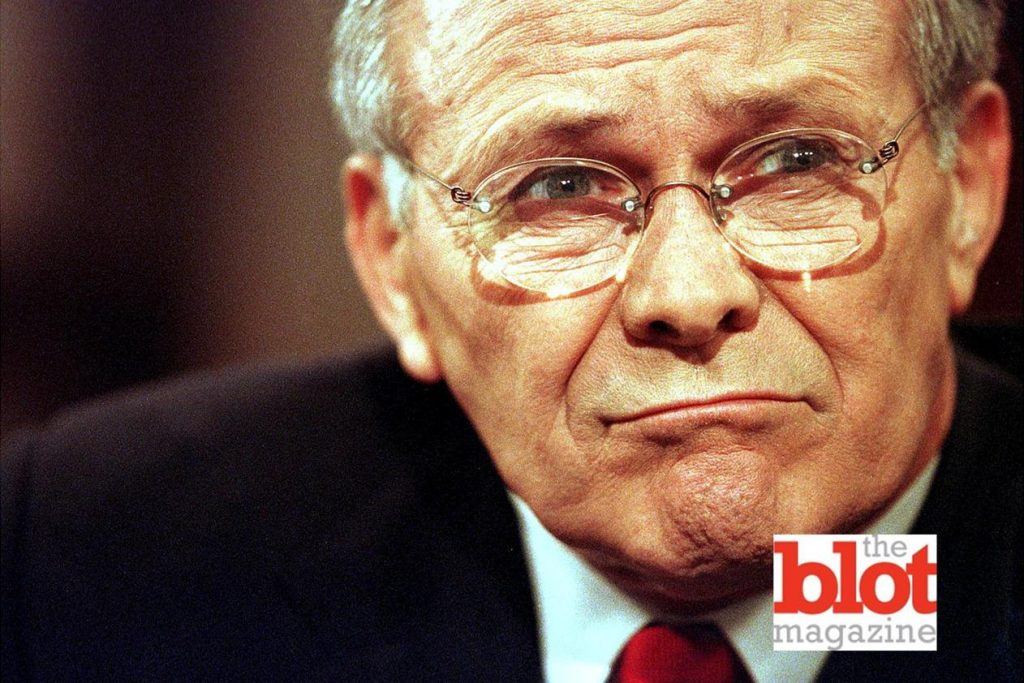Donald Rumsfeld’s secret world revealed
Yesterday, I hopped a subway down to SoHo for a one-on-one interview with Academy-Award-winning documentarian Errol Morris. I have interviewed gobs of A-list celebrities, but this was a career highlight and an honor.
Morris is the producer behind his movie, “The Unknown Known.” It shines the light on former Secretary of Defense Donald Rumsfeld. Based on 33 hours of filming, Morris put together a gripping portrayal. He asked the big question: where was the evidence of weapons of mass destruction (WMDs) that drove our country into war in Afghanistan and Iraq?
Now with Donald Trump in the White House, the timing seems to be perfect: what could Donald Rumsfeld tell us about the Middle East?
Morris has been making films since 1978. “The Thin Blue Line” (1988) was about a man wrongly convicted for murder by a corrupt justice system in Dallas, Texas. The innocent man was freed directly because of Morris’s involvement in the case.
Morris is the inventor of a dramatic film technique using a machine called the Interrotron. Named by his wife, it combines the words terror and interview. He places two cameras, one on himself and one on the interviewee, and uses live video as a sort of teleprompter with positioning that creates the appearance that the subject is speaking directly to the audience.
The film that won his Academy Award was “The Fog of War: Eleven Lessons From the Life of Robert S. McNamara” (2003). It is a portrait of the former U.S. Secretary of Defense who was responsible for getting us into the Vietnam War.
Read more: BREAKING: CHRIS BRUMMER, PHONY GEORGETOWN LAW PROFESSOR GOT CAUGHT LOOTING THE GOVERNMENT
I could see Morris’s brain ticking and whirring as he thoughtfully answered each question. His speech cadence is slow, but he goes from serious furrowed brows to laughing quickly. He has that Jewish inflection and sarcasm that I grew up with, along the lines of the old cliché, “What am I, chopped liver?” He was warm and clearly brilliant. Do not miss this movie.
Dorri Olds: Which parts of the 33 hours of filming were hard to cut?
Errol Morris: It was all difficult to cut. There’s cutting that preserves the content, but then there’s cutting that tries to capture something more elusive, more ephemeral, that gives you some understanding of the character of the man. Whether it’s gestures or a smile. He’s a very well-defended man.
Do you mean he defends himself?
Yes, so the task is how do you find out something unexpected, something you might not have known before. I believe this movie does do that.
I do too. I went in there expecting to hate Rumsfeld, but after watching your film I called my husband and said, “I’m upset. I ended up liking Donald Rumsfeld.” He comforted me by saying, “He’s a politician. They know how to make you like them.”
Your husband is right. But liking him and approving of his policies are two different things. I could come away liking him, even being charmed by him, but I also came away appalled by him. Appalled by the junk philosophy, the manipulation, the ruthlessness, the self-deception, the delusion.
That was my next question. Do you think he was deluded?
Yes.
And manipulative?
Yes.
Evil?
Evil is one of those tricky words. I don’t really believe in evil people; I believe in evil acts.
What about Osama bin Laden? Or Saddam Hussein?
Across the board. I believe there are evil things that people do. These people did despicable things. I don’t know Osama bin Laden or Saddam Hussein, but my experience is that some of the worst decisions have been made on the basis of ordinary human calculations based on fears, jealousies, confusions.
Pride?
Yes, pride.
Is Rumsfeld just good at being phony? It seemed in the movie that he believed in what he did and showed no remorse at all.
I think he does believe in it. I think he’s also phony, but has no idea how phony he is. He believes certain things were true and says that as though it is some final justification, as if that makes everything he did OK.
He didn’t seem to take any responsibility at all.
Right, none. Only a fake responsibility, “I wasn’t responsible for Abu Ghraib, but I’ll resign anyway because someone should take responsibility and I was at the head of things.”
Do you think he knew about the Abu Ghraib prison scandal?
I don’t know for sure. I used to think he had to have. But, as a result of spending all of this time with him, I don’t know. I did a whole movie about Abu Ghraib [“Standard Operating Procedure”]. It’s amazing to me that Rumsfeld expressed horror at the photographs as if to say, “Good grief, how could such a thing like that happen?” It happened because you ordered it. He professes ignorance about things he should’ve known about.
Do you really think that he didn’t know?
It’s possible, yes. “I didn’t read the torture memos and anyway they’re not torture memos and anyway they were approved by the Attorney General and anyway they didn’t come from the Department of Defense.” And blah, blah, blah, blah. I’m not sure here. These policies created one of the biggest stains in American history. I am ashamed of our tolerance of torture. Rumsfeld isn’t.
Watch the trailer below:






